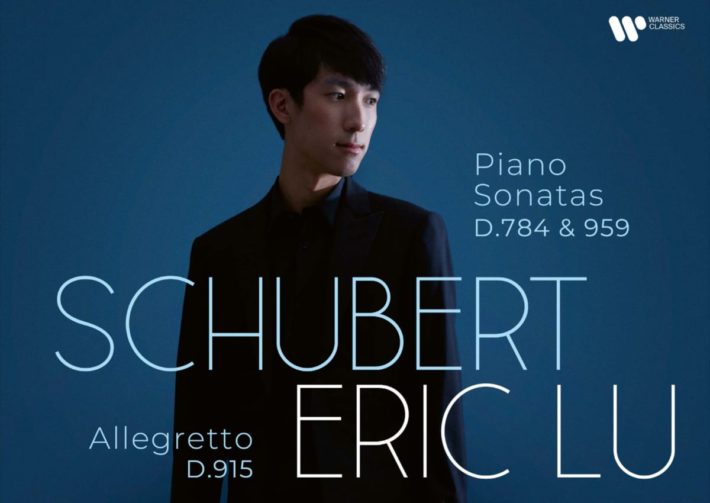In his foreword, pianist Eric Lu admits that he cannot put into words the sheer enormity of Schubert’s musical presence–an astute appraisal, given the transcendent nature of his late sonatas.

The D.959 A major Sonata, Schubert’s penultimate, was written a mere months before his death in 1828. An irony perhaps lies in just how hopefully the work opens: Lu adds to the resolute chords an element of stubbornness via the punctuated phrases. A balance, however, exists with beautiful moments that follow throughout the movement: it’s obvious Lu has thought mindfully about voice leading, textural layering and color changes—which I found especially vibrant.
The Andantino is arguably one of Schubert’s finest slow movements in how masterfully he evokes a wrenching melancholy with so sparse a texture. Of course, for the pianist, this poses a significant musical challenge, but Lu’s intelligent phrasing breathes life and lyricism into even the longest lines. The impeccably even left hand figures play a role in communicating a simplicity that, given the mood, translates into forlornness. The middle section is in stark contrast to the measured rhythms and somber mood of what came prior: here we have an effusive and intriguing section reminiscent of a fantasia in its improvisatory character. I did feel the pianist could let loose a little more to emphasize the contrast—something that Mitsuko Uchida does to full effect in her 1997 recording for Philips. The final movement is lovely, inviting us in with the lovely and elegant charm Lu delivers in the A major theme.
The opening movement of the D.784 minor sonata takes its considerable time (perhaps too much for some) when we consider Schiff’s Decca 1992 account that has a rhythmic brevity and an enigma derived from its breezy, fleeting quality. Lu’s rendition reveals a darker and more contemplative angle to the mysterious phrases, further bolstered by his warm and velvety tone quality. Like we heard in the A major sonata, there is a deliberate element to the way Lu treats his lines. I liked the amount of detail paid to the smallest patterns, such as the two-note gestures of the left hand; they recreate a realistic trudge — the almost dogged trudging of a wanderer. Lu’s introspective approach doesn’t mean that his interpretation is light handed: moments like the grand theme at 1:01 have a satisfying orchestral sound. While I do prefer (ever so slightly) the stormy ferocity of Gilels’ 1965 performance, Lu’s compelling austerity is a good fit for the personality he establishes from the outset.
The Andante, while supple and silky in its sound quality, is one rare instance where the pianist could use more dimensionality: a sinister presence lurks in the small chromatic passages that interrupt the dreamy phrases (which he plays quite well) but the disquietude doesn’t come through enough. The section that begins at 1:20, however, does not disappoint: the warmth and richness that initially emanates intensifies organically into a full-fledged symphonic persona. The Allegro Vivace shows Lu’s nuanced fingerwork, though I did feel the opening passages were a bit too present where they should be more whispery—turn to Maria Joao Pires’ recording for a drier, rustling texture that also captures the sense of mysterious urgency central to the movement.
The C minor Allegretto sandwiched between the two bigger sonatas is a welcome addition that further highlights Lu’s musicality. He sets up an effective dialogue between the declamatory monophonic line and the almost fragile, hymnal response in the relative major key. A surprising contrast further awaits about a minute in when we hear a flash of passion and maybe even anger in the passages which extend in the piano’s bass register.
I enjoyed reading Lu’s introduction, which reflects a heartfelt sincerity for the music he presents. His writing takes the place of the standard analysis, which, given the significance of the works, makes sense–though a bit of historical and musical perspective never hurts. While there are just a few minimal things left to be desired, Lu’s overall effort is fine indeed especially given the caliber of pre-existing landmark recordings. He approaches these difficult works with a thoughtful musicality. Warmly recommended.
Schubert – Piano Sonatas D. 784 & D. 959, Allegretto D. 915
Eric Lu – Piano
Warner Classics, CD 5419729812




















